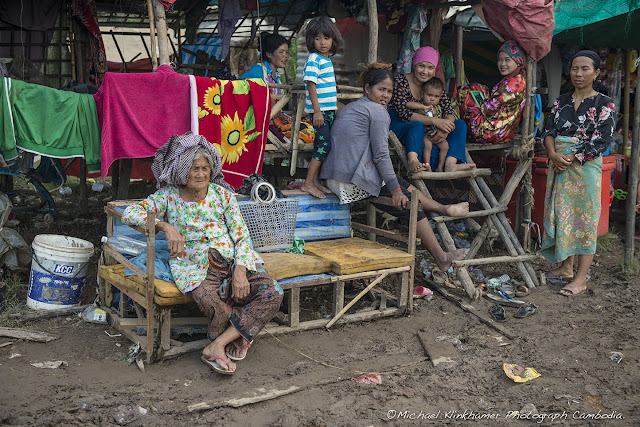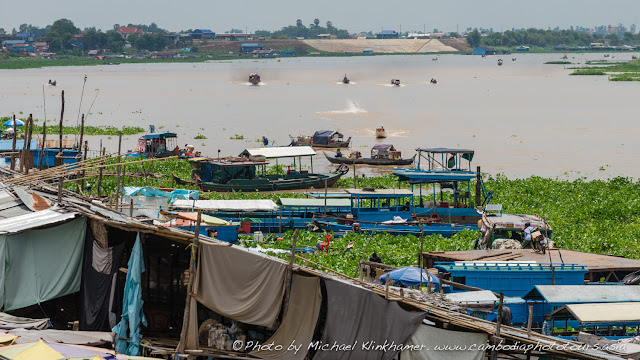“Before They Make Us Disappear.”
Phnom Penh Cham fishing community eviction.
January 2020.
Text and Images by Michael Klinkhamer.
As the sun rises over the Mekong and Tonle Sap Rivers, and its first hot rays hit Phnom Penh, huge baskets full of just caught, still-alive fish are being hurried over the Sisowath Quay directly into the nearest local market.
Along Phnom Penh's "Riverside" at the crack of day, you can find the Chams fishing in the river and mooring their colorful boats and unloading the catch of the night into the local markets.
The abundance of Mekong and Tonle Sap fish, shrimps, river crabs, and shellfish is at this point still very impressive and of huge value to the food supply in Phnom Penh.
But dark clouds are lingering over this major food supply chain in the region for some time now.
The major implications are; unpredictable weather patterns, causing droughts, human population- overfishing, pollution, and the technical side effects by many hydro dams operating in the upper parts of the Mekong.
What was first a dire warning has now become a harsh reality.
The Cham population is already seeing a major decline in the fish stock, especially this year, months before even the dry season has started.
What will people eat when this abundance flow of fish and protein ends?
Who will be able to go out and fish after the expert Cham fishers have all disappeared?
Due to a range of also economic and social issues, the Chams living on the river close to Phnom Penh are now in a real estate dispute.
Who are the Chams?
In the year 1177, guided by a Chinese deserter, the Cham fleet sailed the Mekong river upstream and from Phnom Penh, the Tonle Sap. They took Angkor by surprise, plundering and destroying the town. They quickly withdrew and, from 1181, under the leadership of the future Jayavarman VII, the Khmers won the war against the kingdom of Champa, which was soon reduced to a vassal state of the Khmer empire. It was at the time of the French protectorate (1863-1953) that modern Cham studies were pioneered in Vietnam and Cambodia by scholars such as Aymonier and Cabaton who were also administrators. French protectorate also marks the beginning of the marginalization of Cambodian Chams.
The Khmer Rouge killed about 125,000 Chams, which amounts to half of the Cambodian Cham population.
Source: Publicam.com by Jean-Michel Filippi.
Life on the Mekong and Tonle Sap river is hard, and getting more difficult every year especially for Phnom Penh's Cham fishing community.
Problems like industrial pollution, overfishing and the steady decrease of fish in the rivers caused by the degradation of biodiversity accelerated over the years.
The unstoppable construction of many hydro dams and the start of those hydro dams operating already in the upper parts of the Mekong river won't help either.
The Mekong and Tonle Sap water levels are at this moment at a remarkable low level for this time of the season and things are not looking good for anybody depending on maintaining life on the rivers.
The Chinese Water Resources Authority has issued a notification to water management authorities in Thailand, Laos, Vietnam, Myanmar, and Cambodia. On the planned water discharge reduction from Jinghong dam upstream.
An unavoidable Mekong river disaster is about to happen, the Chams are evicted from their Chroy Changvar peninsula just across from the Royal Palace and Sisowath Quay, and being summoned to go elsewhere on top of that.
The Chroy Changvar peninsula just across from the Royal Palace and Sisowath Quay is a stretch of land just below the huge Sokah hotel and resort building. For months during the wet season, the location is totally flooded and the Chams then are forced to move up on the concrete sloping dike on the higher grounds.
Their meager settlements and makeshift huts have been recently demolished, notice to leave their current location within a week have been given and were executed by police at the end of December 2019.
The reconstruction of that piece of land was already on the way with bulldozers and trucks, plowing through the dusty sand when we were there.
Photographer Michael Klinkhamer has documented the Chroy Changvar Cham village since 2013 and knows most people there.
Yu Hean, 24, is a fisherman and the son of the village chief.
When we talk to him the situation is still unclear to him.
It has been almost a month since the evict verdict arrived.
They asked for an extension for another 7 to 9 months but the written documents have not been legally approved yet.
At the local police station, they are tight-lipped and claim to have no knowledge at all of the situation or decision making.
Yu Hean explains that with the 13th Asia-Europe summit in 2020 taking place at the nearby Sokha Hotel, people might raise a concern about security from the community.
They even have been told that the eviction is out of fear of potential terrorism according to Yu Hean.
This seems to be the least of the probabilities since this group of Chroy Changvar Chams is a very peaceful and hard-working group with no political connection whatsoever.
That is probably the most concerning problem for this particular fishing group that they have no backing or political connection and are being left in the dark for their future and there seems to be no clear solidarity between other Chams in the region at this moment.
Nobody wants to make a ripple in the political water over them.
Meanwhile, the Chams are holding on with their fingernails to the only piece of land they have lived on Chroy Changvar for decades since 1979 and they are only allowed to live on their fishing boats officially from now on.
For reasons beyond their control and what seems to be a long-standing disconnect between the reality of the Chams fishing community and their way of life.
It's a shame their cultural heritage and way of life it does not align with the technocrat and business ambitions of Phnom Penh City.
This city is way too busy and in a transition towards a modern central business district.
The Chroy Changvar Chams, basically river nomads are the first real losers in a dispute toward a beautified, sterile and civilized metropolis.
Leaving the Chams and their amazing culture and crafts out of the future equation.
Out of view to any tourists, they have lived there for many years on that desert-like barren part of the bank of the river during the dry season.
The colorful fishing boats moored and bopping while men and elders are mending the nets and do repairs.
Whole families live in the shack-like structures to get away from the relentless sun or rain and looking after the children, keeping some chicken and ducks, perhaps grow some vegetables.
While going out for fishing the wives and grandmothers take care of their children and meager belongings. Men just get off the water to do maintenance and pray every day at the makeshift mosque. Mothers send the children to nearby schools and sell fish to punters getting on and off the ferry going to the city.
During the wet season, they are forced to stay on their boats and cling to the concrete dike slope for months until the water level recedes and slowly increases their living space into a muddy swamp or barren desert. Always adjusting to the elements, never able to build a sustainable home. The only permanent structure is a makeshift mosque on stilts.
The majority of the Chroy Changvar Cham fleet of tall boats have been cleared already from the Tonle Sap river banks.
Unfortunately, their efforts and their contributions to life in Phnom Penh are without respectful recognition or a fair chance to sustain their centuries-long way of life.
The root of the problem is the disconnect between culture, ethnic diversity, and lack of clear urban planning and more toward foreign investment priorities.
The Phnom Penh City councils and city planners seem to think differently about how Phnom Penh should look to foreigners and visitors who are expected to visit Cambodia during the 13th Asia-Europe summit in 2020.
An inter-governmental meeting that will be held in Phnom Penh where leaders from Asia and Europe meet to discuss how countries from the two continents can improve ties in political, security, economic and cultural cooperation.
As the day ends and the Cham families are sitting on the deck of their boats, an endless stream of river cruise boats float by.
While the tourists are enjoying dinner and cocktails admiring the colorful view of the Chroy Changvar Cham fishing fleet and the red hot sunset, they get a real sense of life on the Mekong river as it always was and probably won't last like this for long anymore.
~~END~~





























This comment has been removed by a blog administrator.
ReplyDelete